Cognitive Psychology: A Deep Dive into Tasks 1 and 2 Analysis
VerifiedAdded on 2023/01/06
|9
|1941
|53
Homework Assignment
AI Summary
This assignment delves into cognitive psychology, exploring the human mind's similarity to a computer in information processing and storage. Task 1 examines the Atkinson and Shiffrin information processing model, detailing how humans and computers handle information, and also discusses how and why humans forget information, relating it to computer data loss. Task 2 focuses on memory organization, comparing the hierarchical and spreading activation models, and also provides a diagrammatic description of the models. The analysis highlights key concepts in cognitive psychology, offering insights into memory processes and the factors influencing forgetting.
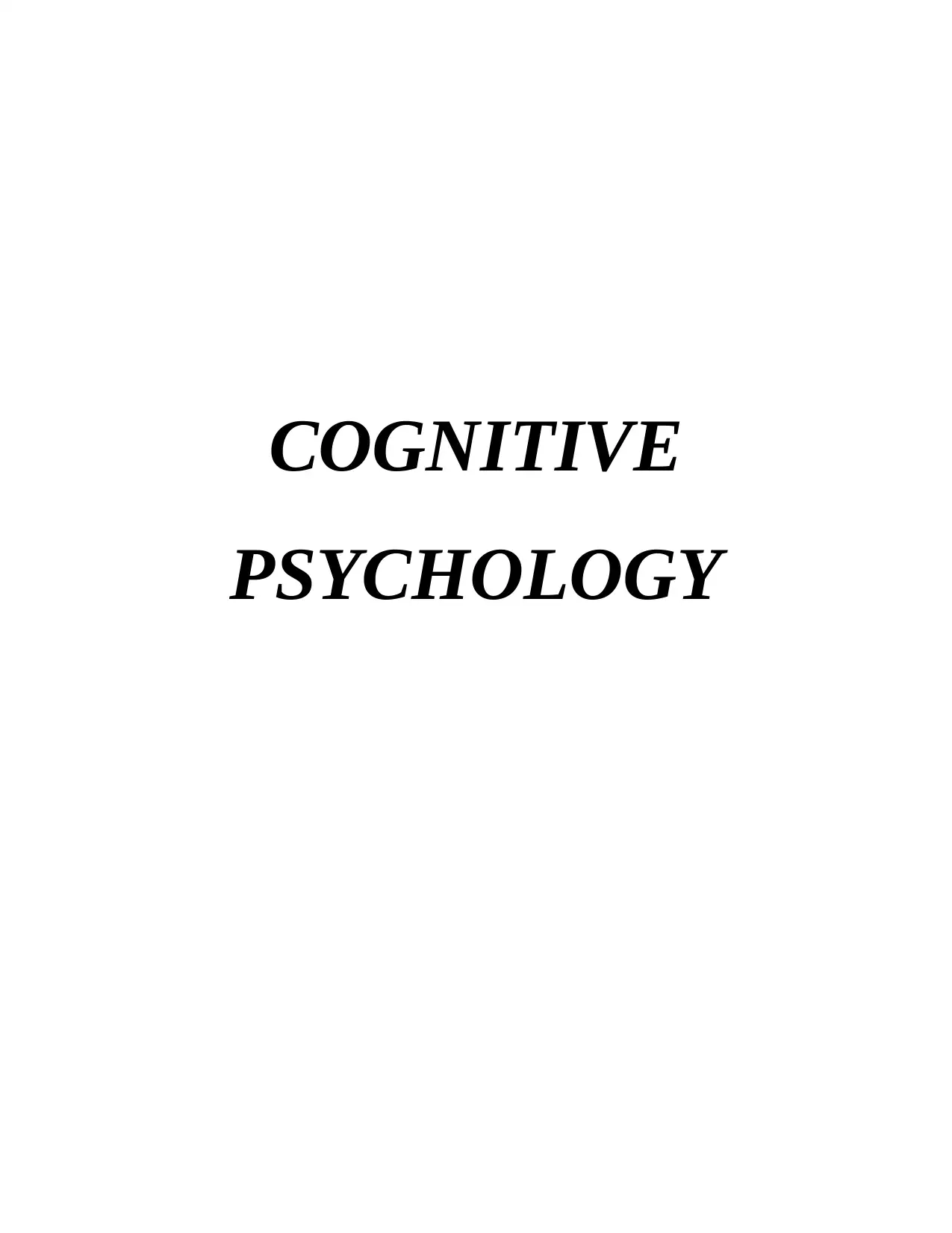
COGNITIVE
PSYCHOLOGY
PSYCHOLOGY
Paraphrase This Document
Need a fresh take? Get an instant paraphrase of this document with our AI Paraphraser

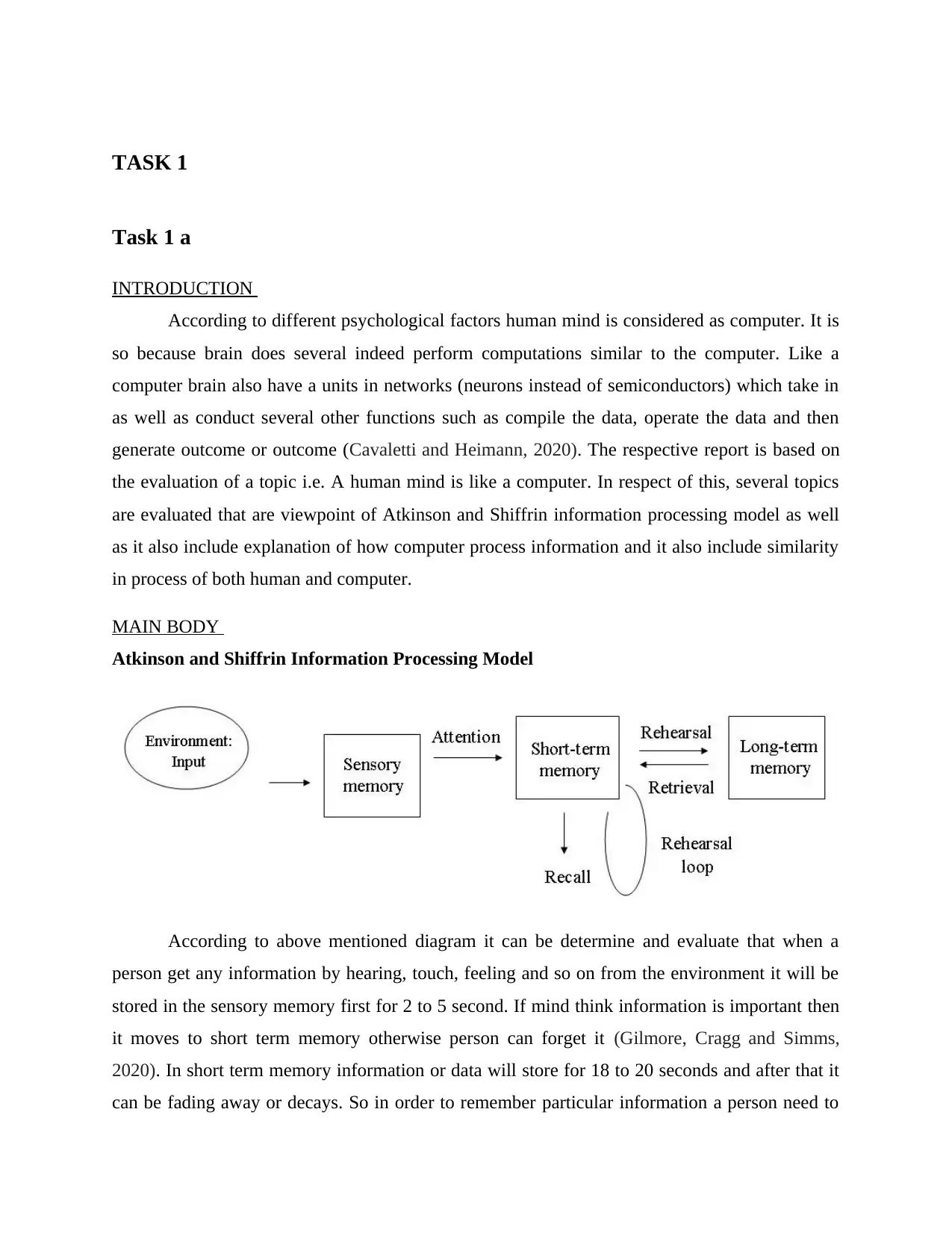
TASK 1
Task 1 a
INTRODUCTION
According to different psychological factors human mind is considered as computer. It is
so because brain does several indeed perform computations similar to the computer. Like a
computer brain also have a units in networks (neurons instead of semiconductors) which take in
as well as conduct several other functions such as compile the data, operate the data and then
generate outcome or outcome (Cavaletti and Heimann, 2020). The respective report is based on
the evaluation of a topic i.e. A human mind is like a computer. In respect of this, several topics
are evaluated that are viewpoint of Atkinson and Shiffrin information processing model as well
as it also include explanation of how computer process information and it also include similarity
in process of both human and computer.
MAIN BODY
Atkinson and Shiffrin Information Processing Model
According to above mentioned diagram it can be determine and evaluate that when a
person get any information by hearing, touch, feeling and so on from the environment it will be
stored in the sensory memory first for 2 to 5 second. If mind think information is important then
it moves to short term memory otherwise person can forget it (Gilmore, Cragg and Simms,
2020). In short term memory information or data will store for 18 to 20 seconds and after that it
can be fading away or decays. So in order to remember particular information a person need to
Task 1 a
INTRODUCTION
According to different psychological factors human mind is considered as computer. It is
so because brain does several indeed perform computations similar to the computer. Like a
computer brain also have a units in networks (neurons instead of semiconductors) which take in
as well as conduct several other functions such as compile the data, operate the data and then
generate outcome or outcome (Cavaletti and Heimann, 2020). The respective report is based on
the evaluation of a topic i.e. A human mind is like a computer. In respect of this, several topics
are evaluated that are viewpoint of Atkinson and Shiffrin information processing model as well
as it also include explanation of how computer process information and it also include similarity
in process of both human and computer.
MAIN BODY
Atkinson and Shiffrin Information Processing Model
According to above mentioned diagram it can be determine and evaluate that when a
person get any information by hearing, touch, feeling and so on from the environment it will be
stored in the sensory memory first for 2 to 5 second. If mind think information is important then
it moves to short term memory otherwise person can forget it (Gilmore, Cragg and Simms,
2020). In short term memory information or data will store for 18 to 20 seconds and after that it
can be fading away or decays. So in order to remember particular information a person need to
⊘ This is a preview!⊘
Do you want full access?
Subscribe today to unlock all pages.

Trusted by 1+ million students worldwide
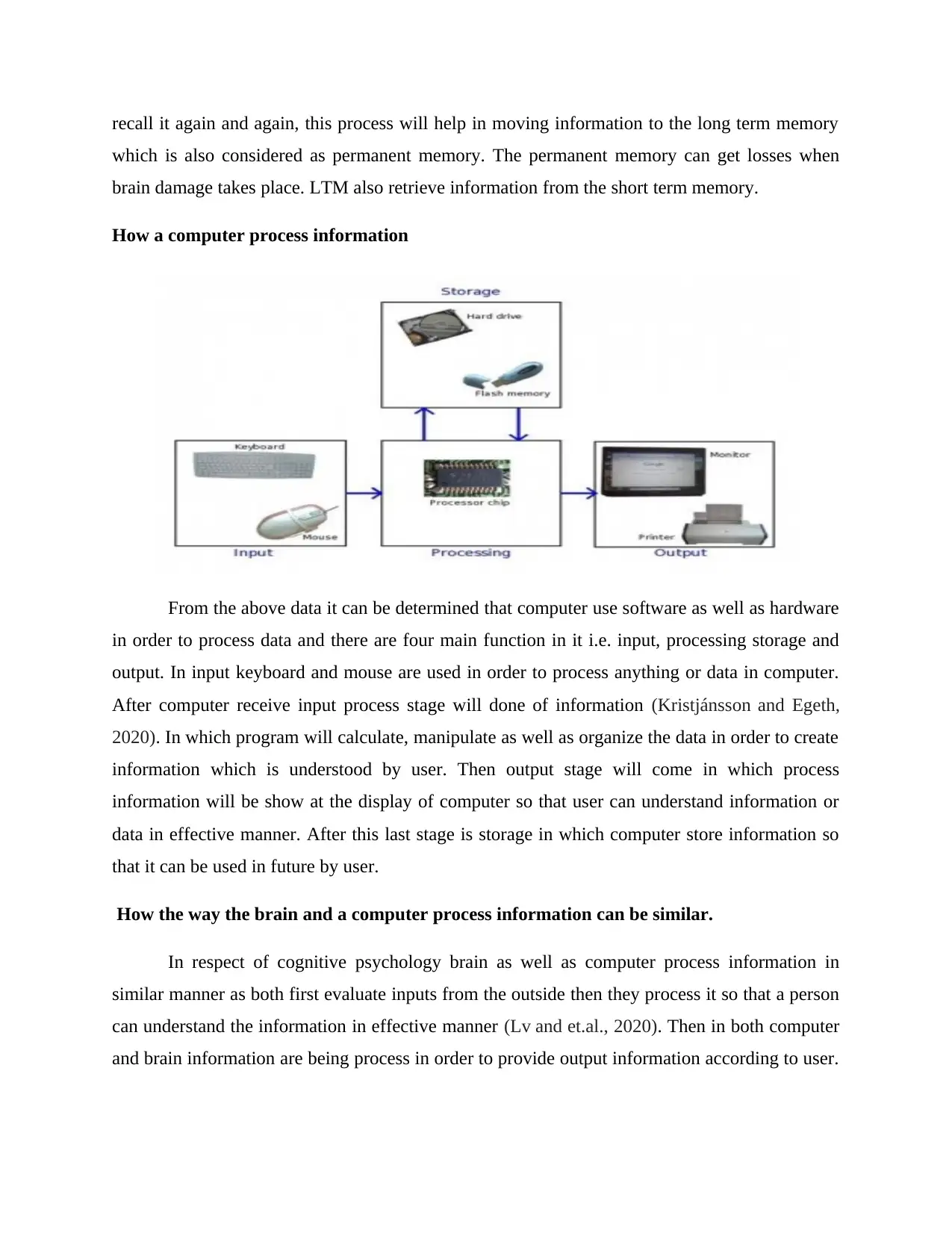
recall it again and again, this process will help in moving information to the long term memory
which is also considered as permanent memory. The permanent memory can get losses when
brain damage takes place. LTM also retrieve information from the short term memory.
How a computer process information
From the above data it can be determined that computer use software as well as hardware
in order to process data and there are four main function in it i.e. input, processing storage and
output. In input keyboard and mouse are used in order to process anything or data in computer.
After computer receive input process stage will done of information (Kristjánsson and Egeth,
2020). In which program will calculate, manipulate as well as organize the data in order to create
information which is understood by user. Then output stage will come in which process
information will be show at the display of computer so that user can understand information or
data in effective manner. After this last stage is storage in which computer store information so
that it can be used in future by user.
How the way the brain and a computer process information can be similar.
In respect of cognitive psychology brain as well as computer process information in
similar manner as both first evaluate inputs from the outside then they process it so that a person
can understand the information in effective manner (Lv and et.al., 2020). Then in both computer
and brain information are being process in order to provide output information according to user.
which is also considered as permanent memory. The permanent memory can get losses when
brain damage takes place. LTM also retrieve information from the short term memory.
How a computer process information
From the above data it can be determined that computer use software as well as hardware
in order to process data and there are four main function in it i.e. input, processing storage and
output. In input keyboard and mouse are used in order to process anything or data in computer.
After computer receive input process stage will done of information (Kristjánsson and Egeth,
2020). In which program will calculate, manipulate as well as organize the data in order to create
information which is understood by user. Then output stage will come in which process
information will be show at the display of computer so that user can understand information or
data in effective manner. After this last stage is storage in which computer store information so
that it can be used in future by user.
How the way the brain and a computer process information can be similar.
In respect of cognitive psychology brain as well as computer process information in
similar manner as both first evaluate inputs from the outside then they process it so that a person
can understand the information in effective manner (Lv and et.al., 2020). Then in both computer
and brain information are being process in order to provide output information according to user.
Paraphrase This Document
Need a fresh take? Get an instant paraphrase of this document with our AI Paraphraser
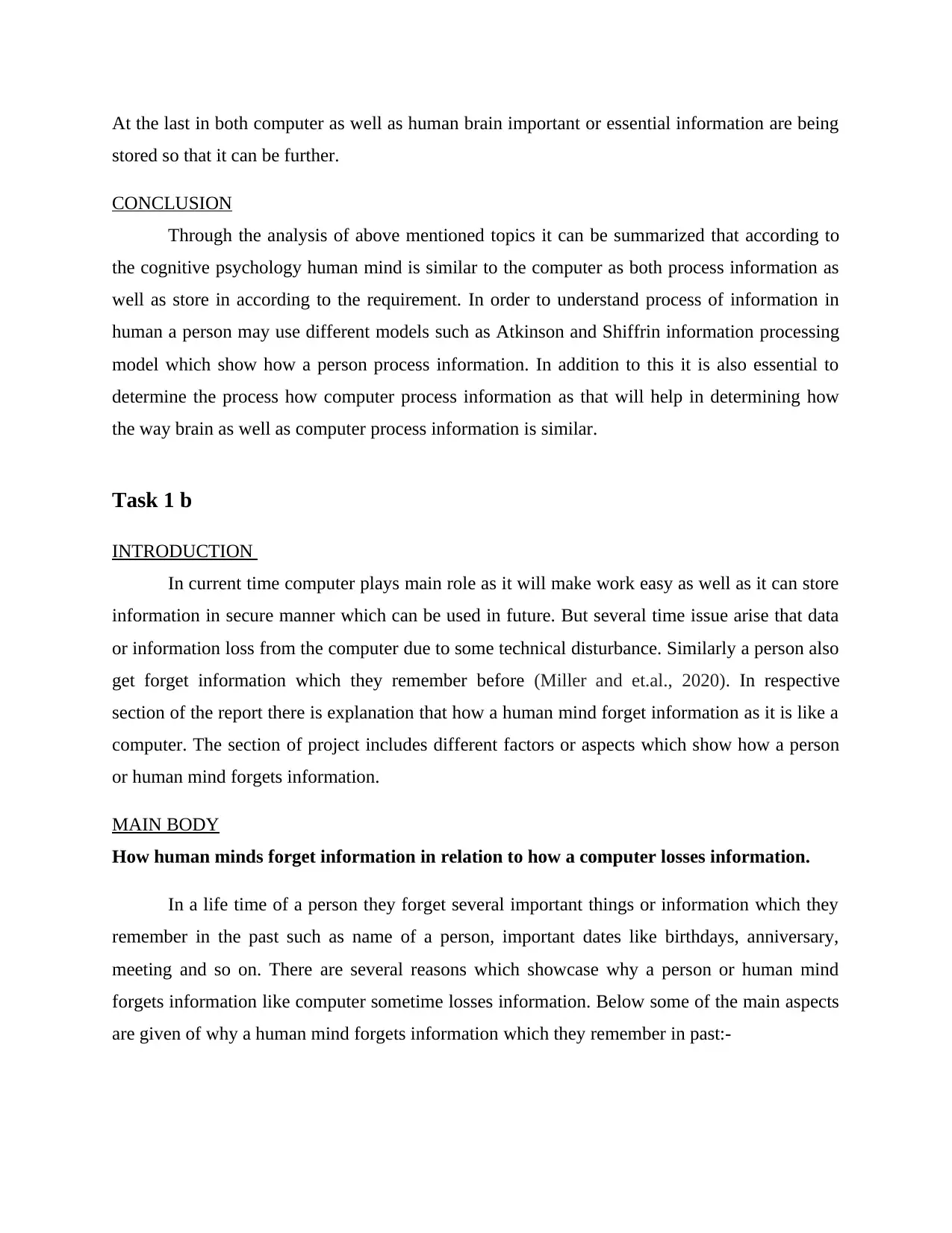
At the last in both computer as well as human brain important or essential information are being
stored so that it can be further.
CONCLUSION
Through the analysis of above mentioned topics it can be summarized that according to
the cognitive psychology human mind is similar to the computer as both process information as
well as store in according to the requirement. In order to understand process of information in
human a person may use different models such as Atkinson and Shiffrin information processing
model which show how a person process information. In addition to this it is also essential to
determine the process how computer process information as that will help in determining how
the way brain as well as computer process information is similar.
Task 1 b
INTRODUCTION
In current time computer plays main role as it will make work easy as well as it can store
information in secure manner which can be used in future. But several time issue arise that data
or information loss from the computer due to some technical disturbance. Similarly a person also
get forget information which they remember before (Miller and et.al., 2020). In respective
section of the report there is explanation that how a human mind forget information as it is like a
computer. The section of project includes different factors or aspects which show how a person
or human mind forgets information.
MAIN BODY
How human minds forget information in relation to how a computer losses information.
In a life time of a person they forget several important things or information which they
remember in the past such as name of a person, important dates like birthdays, anniversary,
meeting and so on. There are several reasons which showcase why a person or human mind
forgets information like computer sometime losses information. Below some of the main aspects
are given of why a human mind forgets information which they remember in past:-
stored so that it can be further.
CONCLUSION
Through the analysis of above mentioned topics it can be summarized that according to
the cognitive psychology human mind is similar to the computer as both process information as
well as store in according to the requirement. In order to understand process of information in
human a person may use different models such as Atkinson and Shiffrin information processing
model which show how a person process information. In addition to this it is also essential to
determine the process how computer process information as that will help in determining how
the way brain as well as computer process information is similar.
Task 1 b
INTRODUCTION
In current time computer plays main role as it will make work easy as well as it can store
information in secure manner which can be used in future. But several time issue arise that data
or information loss from the computer due to some technical disturbance. Similarly a person also
get forget information which they remember before (Miller and et.al., 2020). In respective
section of the report there is explanation that how a human mind forget information as it is like a
computer. The section of project includes different factors or aspects which show how a person
or human mind forgets information.
MAIN BODY
How human minds forget information in relation to how a computer losses information.
In a life time of a person they forget several important things or information which they
remember in the past such as name of a person, important dates like birthdays, anniversary,
meeting and so on. There are several reasons which showcase why a person or human mind
forgets information like computer sometime losses information. Below some of the main aspects
are given of why a human mind forgets information which they remember in past:-
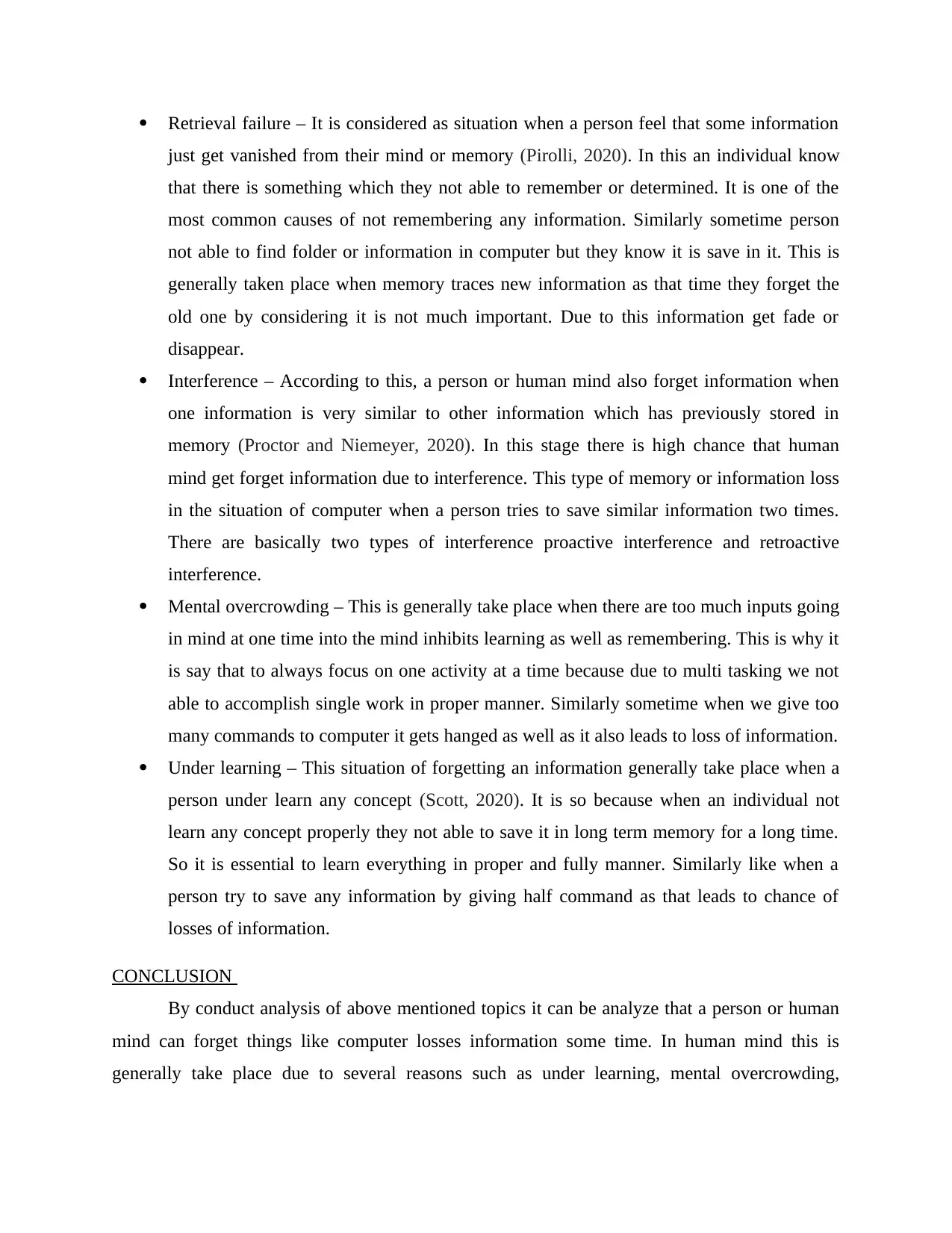
Retrieval failure – It is considered as situation when a person feel that some information
just get vanished from their mind or memory (Pirolli, 2020). In this an individual know
that there is something which they not able to remember or determined. It is one of the
most common causes of not remembering any information. Similarly sometime person
not able to find folder or information in computer but they know it is save in it. This is
generally taken place when memory traces new information as that time they forget the
old one by considering it is not much important. Due to this information get fade or
disappear.
Interference – According to this, a person or human mind also forget information when
one information is very similar to other information which has previously stored in
memory (Proctor and Niemeyer, 2020). In this stage there is high chance that human
mind get forget information due to interference. This type of memory or information loss
in the situation of computer when a person tries to save similar information two times.
There are basically two types of interference proactive interference and retroactive
interference.
Mental overcrowding – This is generally take place when there are too much inputs going
in mind at one time into the mind inhibits learning as well as remembering. This is why it
is say that to always focus on one activity at a time because due to multi tasking we not
able to accomplish single work in proper manner. Similarly sometime when we give too
many commands to computer it gets hanged as well as it also leads to loss of information.
Under learning – This situation of forgetting an information generally take place when a
person under learn any concept (Scott, 2020). It is so because when an individual not
learn any concept properly they not able to save it in long term memory for a long time.
So it is essential to learn everything in proper and fully manner. Similarly like when a
person try to save any information by giving half command as that leads to chance of
losses of information.
CONCLUSION
By conduct analysis of above mentioned topics it can be analyze that a person or human
mind can forget things like computer losses information some time. In human mind this is
generally take place due to several reasons such as under learning, mental overcrowding,
just get vanished from their mind or memory (Pirolli, 2020). In this an individual know
that there is something which they not able to remember or determined. It is one of the
most common causes of not remembering any information. Similarly sometime person
not able to find folder or information in computer but they know it is save in it. This is
generally taken place when memory traces new information as that time they forget the
old one by considering it is not much important. Due to this information get fade or
disappear.
Interference – According to this, a person or human mind also forget information when
one information is very similar to other information which has previously stored in
memory (Proctor and Niemeyer, 2020). In this stage there is high chance that human
mind get forget information due to interference. This type of memory or information loss
in the situation of computer when a person tries to save similar information two times.
There are basically two types of interference proactive interference and retroactive
interference.
Mental overcrowding – This is generally take place when there are too much inputs going
in mind at one time into the mind inhibits learning as well as remembering. This is why it
is say that to always focus on one activity at a time because due to multi tasking we not
able to accomplish single work in proper manner. Similarly sometime when we give too
many commands to computer it gets hanged as well as it also leads to loss of information.
Under learning – This situation of forgetting an information generally take place when a
person under learn any concept (Scott, 2020). It is so because when an individual not
learn any concept properly they not able to save it in long term memory for a long time.
So it is essential to learn everything in proper and fully manner. Similarly like when a
person try to save any information by giving half command as that leads to chance of
losses of information.
CONCLUSION
By conduct analysis of above mentioned topics it can be analyze that a person or human
mind can forget things like computer losses information some time. In human mind this is
generally take place due to several reasons such as under learning, mental overcrowding,
⊘ This is a preview!⊘
Do you want full access?
Subscribe today to unlock all pages.

Trusted by 1+ million students worldwide
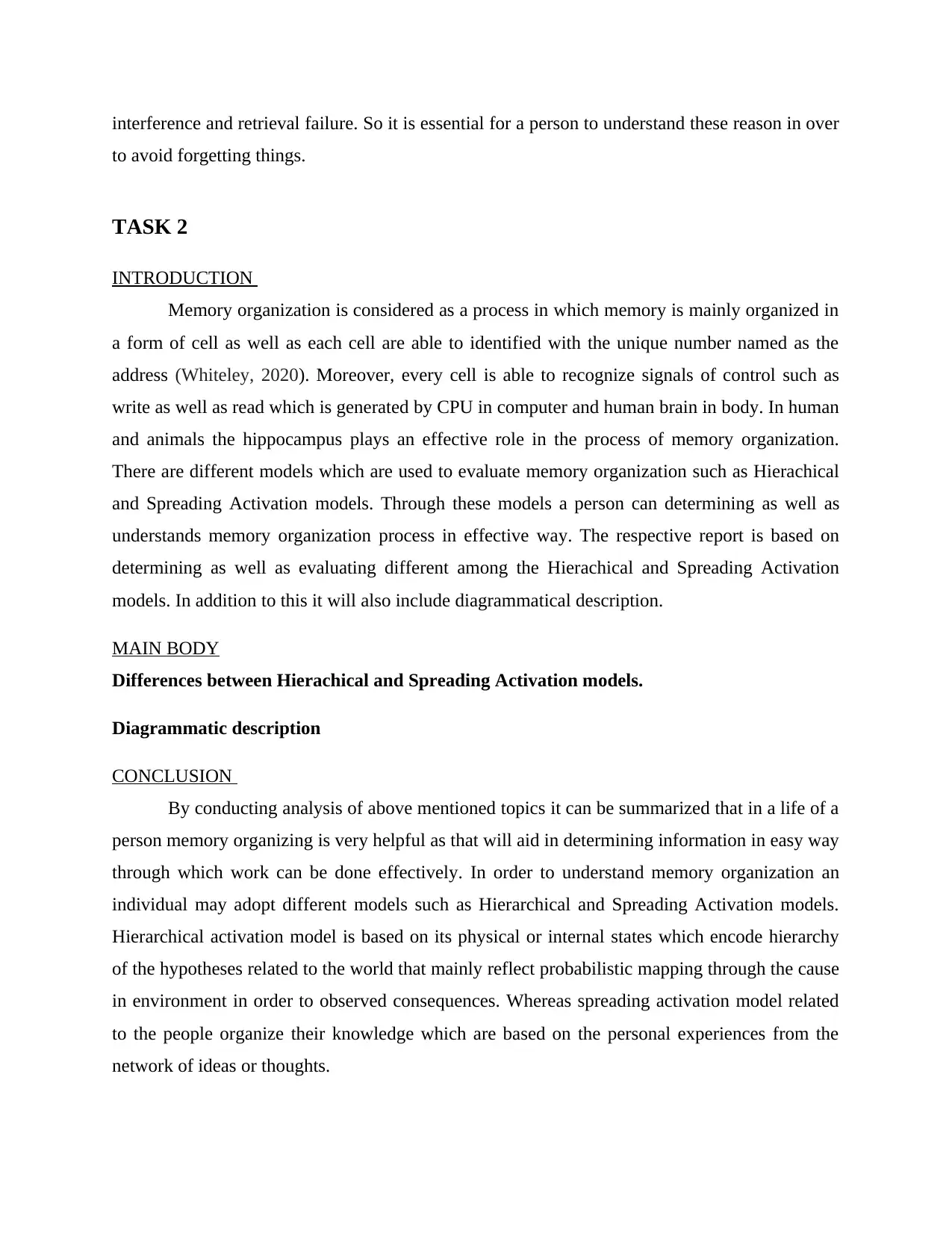
interference and retrieval failure. So it is essential for a person to understand these reason in over
to avoid forgetting things.
TASK 2
INTRODUCTION
Memory organization is considered as a process in which memory is mainly organized in
a form of cell as well as each cell are able to identified with the unique number named as the
address (Whiteley, 2020). Moreover, every cell is able to recognize signals of control such as
write as well as read which is generated by CPU in computer and human brain in body. In human
and animals the hippocampus plays an effective role in the process of memory organization.
There are different models which are used to evaluate memory organization such as Hierachical
and Spreading Activation models. Through these models a person can determining as well as
understands memory organization process in effective way. The respective report is based on
determining as well as evaluating different among the Hierachical and Spreading Activation
models. In addition to this it will also include diagrammatical description.
MAIN BODY
Differences between Hierachical and Spreading Activation models.
Diagrammatic description
CONCLUSION
By conducting analysis of above mentioned topics it can be summarized that in a life of a
person memory organizing is very helpful as that will aid in determining information in easy way
through which work can be done effectively. In order to understand memory organization an
individual may adopt different models such as Hierarchical and Spreading Activation models.
Hierarchical activation model is based on its physical or internal states which encode hierarchy
of the hypotheses related to the world that mainly reflect probabilistic mapping through the cause
in environment in order to observed consequences. Whereas spreading activation model related
to the people organize their knowledge which are based on the personal experiences from the
network of ideas or thoughts.
to avoid forgetting things.
TASK 2
INTRODUCTION
Memory organization is considered as a process in which memory is mainly organized in
a form of cell as well as each cell are able to identified with the unique number named as the
address (Whiteley, 2020). Moreover, every cell is able to recognize signals of control such as
write as well as read which is generated by CPU in computer and human brain in body. In human
and animals the hippocampus plays an effective role in the process of memory organization.
There are different models which are used to evaluate memory organization such as Hierachical
and Spreading Activation models. Through these models a person can determining as well as
understands memory organization process in effective way. The respective report is based on
determining as well as evaluating different among the Hierachical and Spreading Activation
models. In addition to this it will also include diagrammatical description.
MAIN BODY
Differences between Hierachical and Spreading Activation models.
Diagrammatic description
CONCLUSION
By conducting analysis of above mentioned topics it can be summarized that in a life of a
person memory organizing is very helpful as that will aid in determining information in easy way
through which work can be done effectively. In order to understand memory organization an
individual may adopt different models such as Hierarchical and Spreading Activation models.
Hierarchical activation model is based on its physical or internal states which encode hierarchy
of the hypotheses related to the world that mainly reflect probabilistic mapping through the cause
in environment in order to observed consequences. Whereas spreading activation model related
to the people organize their knowledge which are based on the personal experiences from the
network of ideas or thoughts.
Paraphrase This Document
Need a fresh take? Get an instant paraphrase of this document with our AI Paraphraser

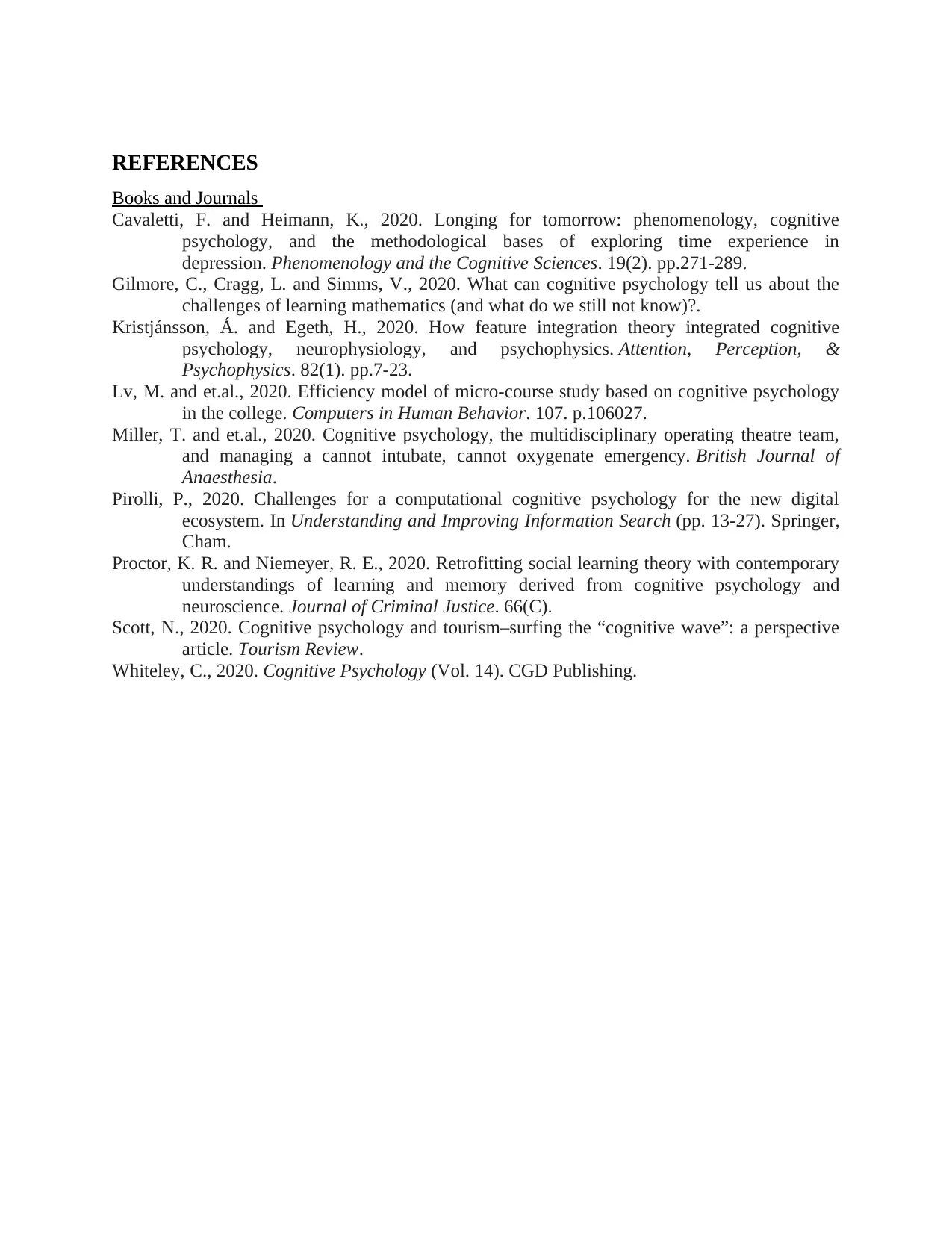
REFERENCES
Books and Journals
Cavaletti, F. and Heimann, K., 2020. Longing for tomorrow: phenomenology, cognitive
psychology, and the methodological bases of exploring time experience in
depression. Phenomenology and the Cognitive Sciences. 19(2). pp.271-289.
Gilmore, C., Cragg, L. and Simms, V., 2020. What can cognitive psychology tell us about the
challenges of learning mathematics (and what do we still not know)?.
Kristjánsson, Á. and Egeth, H., 2020. How feature integration theory integrated cognitive
psychology, neurophysiology, and psychophysics. Attention, Perception, &
Psychophysics. 82(1). pp.7-23.
Lv, M. and et.al., 2020. Efficiency model of micro-course study based on cognitive psychology
in the college. Computers in Human Behavior. 107. p.106027.
Miller, T. and et.al., 2020. Cognitive psychology, the multidisciplinary operating theatre team,
and managing a cannot intubate, cannot oxygenate emergency. British Journal of
Anaesthesia.
Pirolli, P., 2020. Challenges for a computational cognitive psychology for the new digital
ecosystem. In Understanding and Improving Information Search (pp. 13-27). Springer,
Cham.
Proctor, K. R. and Niemeyer, R. E., 2020. Retrofitting social learning theory with contemporary
understandings of learning and memory derived from cognitive psychology and
neuroscience. Journal of Criminal Justice. 66(C).
Scott, N., 2020. Cognitive psychology and tourism–surfing the “cognitive wave”: a perspective
article. Tourism Review.
Whiteley, C., 2020. Cognitive Psychology (Vol. 14). CGD Publishing.
Books and Journals
Cavaletti, F. and Heimann, K., 2020. Longing for tomorrow: phenomenology, cognitive
psychology, and the methodological bases of exploring time experience in
depression. Phenomenology and the Cognitive Sciences. 19(2). pp.271-289.
Gilmore, C., Cragg, L. and Simms, V., 2020. What can cognitive psychology tell us about the
challenges of learning mathematics (and what do we still not know)?.
Kristjánsson, Á. and Egeth, H., 2020. How feature integration theory integrated cognitive
psychology, neurophysiology, and psychophysics. Attention, Perception, &
Psychophysics. 82(1). pp.7-23.
Lv, M. and et.al., 2020. Efficiency model of micro-course study based on cognitive psychology
in the college. Computers in Human Behavior. 107. p.106027.
Miller, T. and et.al., 2020. Cognitive psychology, the multidisciplinary operating theatre team,
and managing a cannot intubate, cannot oxygenate emergency. British Journal of
Anaesthesia.
Pirolli, P., 2020. Challenges for a computational cognitive psychology for the new digital
ecosystem. In Understanding and Improving Information Search (pp. 13-27). Springer,
Cham.
Proctor, K. R. and Niemeyer, R. E., 2020. Retrofitting social learning theory with contemporary
understandings of learning and memory derived from cognitive psychology and
neuroscience. Journal of Criminal Justice. 66(C).
Scott, N., 2020. Cognitive psychology and tourism–surfing the “cognitive wave”: a perspective
article. Tourism Review.
Whiteley, C., 2020. Cognitive Psychology (Vol. 14). CGD Publishing.
⊘ This is a preview!⊘
Do you want full access?
Subscribe today to unlock all pages.

Trusted by 1+ million students worldwide
1 out of 9
Related Documents
Your All-in-One AI-Powered Toolkit for Academic Success.
+13062052269
info@desklib.com
Available 24*7 on WhatsApp / Email
![[object Object]](/_next/static/media/star-bottom.7253800d.svg)
Unlock your academic potential
Copyright © 2020–2026 A2Z Services. All Rights Reserved. Developed and managed by ZUCOL.




